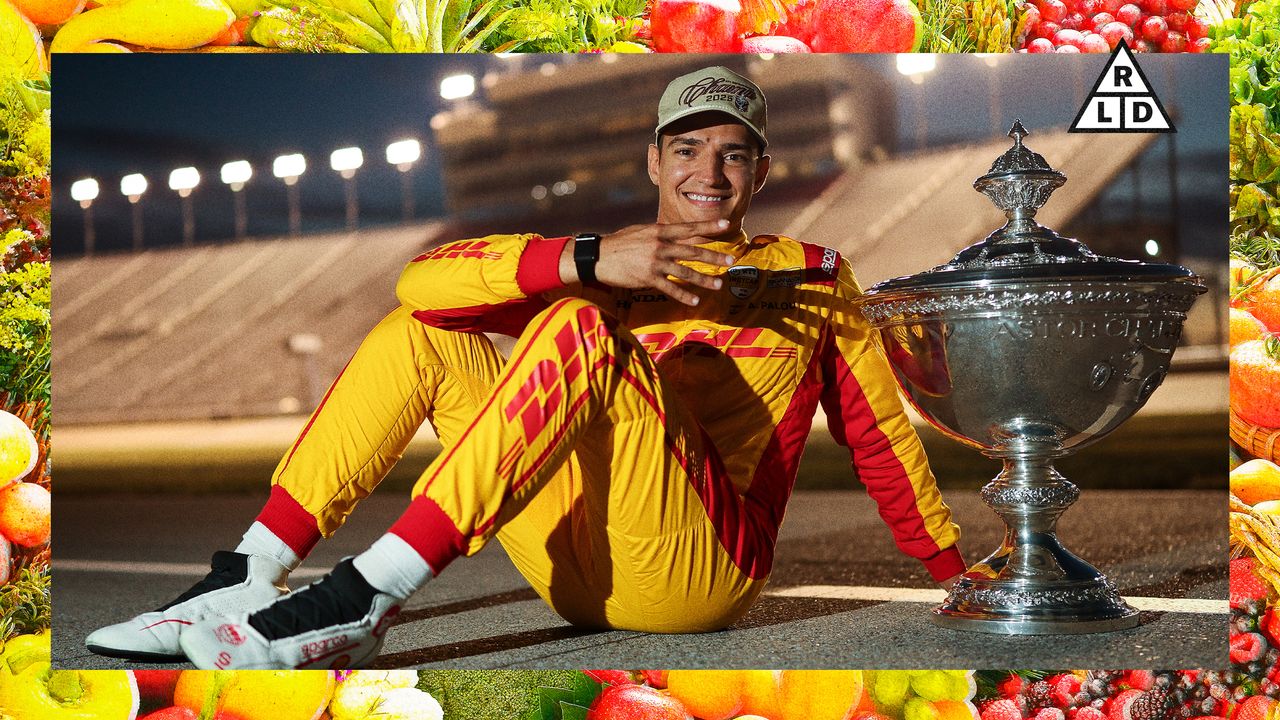Alex Palou is really good at winning. The accomplished driver won the IndyCar Series championship in 2021, then rattled off a threepeat from 2023 to 2025. During his title run this year, he also won the Indianapolis 500, the sport’s crown jewel. Born in Spain, the 28-year-old now resides in Indianapolis, where he’s struggling to find some of the delicacies he grew up on.
But, as he continues to acclimate to the Midwest, he’s also learning how to effectively train his mind, body, and stove. Palou doesn’t fancy himself as much of a cook, but he can whip up a mean pancake. He’s also extremely well-versed in CrossFit, something he came to in search of non-traditional driver training.
With his optimistic attitude, European upbringing, and a two-year-old daughter now in the mix, Palou has an eclectic set of health and wellness opinions, practices, and strategies that repeatedly send him to victory lane.
What is training like for an IndyCar driver? I imagine there’s a lot of mental as well as the physical stuff?
So, in IndyCar, we don’t have power steering. The steering wheel—it’s super, super heavy, and especially on road and street courses for the two-hour races, what we need to work the most is just our arms and our neck. There’s other series that have power steering. They don’t really need to work on their arms and shoulders as much.
I think racing, as it’s not like a pure, physical-only sport, [training] varies between drivers. What works for me—and what I’ve been doing for the six, seven years since I’ve been in IndyCar—has been doing CrossFit. After CrossFit, I do some stuff that’s driving specific, let’s say, like a lot of neck work, grip work, and stuff that we normally use for driving when we’re in an IndyCar.
Besides CrossFit, is there weight training? Do you have a whole circuit that you do in the weight room?
Yeah, I have a trainer and I do a little bit of everything. I always have. I normally start the day with movements to warm up, then I do weights. After the weights I finish with a CrossFit workout at the end that’s just a little bit more explosive. It’s quite similar to what we feel in the car, having to lift weights while the heart rate is up and you have tension. I do that every day, in-season or offseason.
Cardio is a big part of it. I used to mountain bike, but I broke my collarbone ten years ago. So, I stopped, just because of the risk of falling from a bike. I tried different cardios, like swimming or indoor biking. But what I do now is just running.
What’s the hardest part about the training and the exercise for you? Is there something that you had to really tell yourself, you know what? This is just part of the job. I’ve got to do it even though I hate this.
Running! I can’t. I don’t like it. I’m starting to enjoy it, especially this year because I was like, “Hey, Alex, you need to run three or four times a week no matter what, even if I’m racing.” I started to enjoy it a little bit more, but it’s tough. It’s tough for me to go run and to get those cardio sessions. They are important, but they are not as fun as just lifting weights or competing against somebody when you’re working out.
Normally outside if I can. I prefer that. Obviously, when it’s super cold, or I don’t have as much time, a treadmill is good. But yeah, outside every time I can.
When you’re in a race, how important is hydration?
So, in the car we have a system that stores—I don’t know, one liter, maybe two liters of water—or whatever drink you want. We basically have a system where we press a button on our steering and there’s a small pump that throws water. It’s very important. We use that a lot, every single race, because our races are an hour and a half to two and a half hours long. And it’s normally super warm inside the car, so it’s super important to have that hydration. Whenever [the system] doesn’t work, you feel it. Your performance goes down.
Does hydration start right away? Like, wake up, have a glass of water? Do you have to hit a certain amount of ounces per day or do you just go with the flow?
I don’t hit a certain number. I used to have a goal of, “Okay, this is what I’ll do before breakfast, or as soon as I wake up.” But it was tough to follow. So, I hydrate a lot, but I just go with it.
Do you feel like there’s something you do, or parts of your training and routine, that really give you an advantage over the other drivers?
Yeah, for sure. I think there’s some movements in the way we work out that help me a lot. I think the most important thing for us as drivers is that you get to a point where your physical is not slowing you down. Then you can focus on driving and not worry about breathing, or about not being strong enough, or any of that stuff. On top of that, I think that being able to keep your heart rate low helps you focus so much more, helps you be a lot more relaxed. There’s a lot of stuff that we do that I know that helps me. I don’t know if it would help everybody else.

